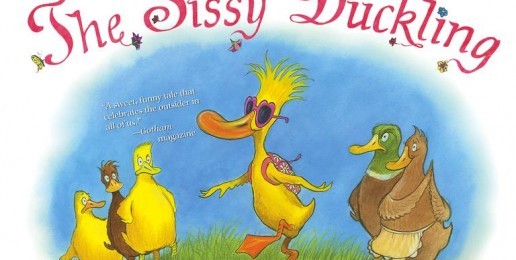
The typical American mother would be a bit uncomfortable letting her six-year-old child browse the “alternative lifestyles” section in the local Barnes and Noble. Instead, she would direct his attention to the safe and welcoming shelves of the brightly colored children’s book department. Amid the familiar stories of Peter Rabbit and Curious George, the little tyke should be safe from the propaganda of the cultural left.
But there he may meet a lonely and misunderstood little duck named Elmer, in a new retelling of Hans Christian Andersen‘s classic tale, “The Ugly Duckling,” written for five-to-eight-year-old children. In this version, the duckling is “not like the other boy ducklings,” not because he is a swan, but because he is “a great big sissy.”
Now, there have been plenty of children’s books designed to encourage the daydreaming bookworm or the shy computer enthusiast. The Sissy Duckling is not one of those books. Instead, this lushly illustrated and engagingly narrated volume packages the chants of the gay rights protestors [sic] in the gentle tones of a bedtime story. The author, after all, is Harvey Fierstein, who is introduced in his dust-jacket bio as “a three-time Tony Award-winning writer, actor, and gay rights activist.”
The book spoon-feeds children the ideology of socially constructed gender roles and biologically unchangeable sexual orientation. The sissy duckling’s mother tells him: “You are special, Elmer, and being special sometimes scares those who are not.” The book closes by noting that Elmer “always did remain special” and that he later ventured out into the world where he “met lots of other ducks just like himself.”
Ironically, however, the tale of the sissy duckling unintentionally subverts the very core of the gay liberationist argument-namely, that sexual orientation is a mere dictate of nature. The underlying sub-theme of the book is the duckling’s alienation from his cold, distant father and his identification with his doting, protective mother. Elmer cowers in his room while he hears his mother defending him to his father, who declares that the sissy “is no son of mine!”
Harvey Fierstein is perhaps more revealing than he intended when the story moves to Elmer’s nursing his father back to health after a hunter’s gunshot wounds the papa duck. The two of them are tucked away in Elmer’s little house for the entire winter, where “all winter long they played games and told jokes and made things and laughed and talked and got to know each other.” The book ends with Elmer, now a hero, finally receiving the affirmation of his father.
Joseph and Linda Nicolosi make a compelling case in their Preventing Homosexuality: A Parents Guide that gender identity disorder in children is indeed linked to the all-too-familiar pattern of an emotionally avoidant father and an overprotective mother. They amass a vast array of evidence to suggest that most male homosexuality starts as a longing for the kind of male affirmation that only a father can give. It is almost painfully poignant to read The Sissy Duckling, as one wonders if this book is one homosexual activist’s way of crying out for the father who was never there.
Model Stories
Conservative Christians were outraged a few years ago by books such as Daddy’s Roommate and Heather Has Two Mommies. But those volumes were upfront about their agenda. Books such as The Sissy Duckling are subtler.
Children’s literature is no trifling matter. It shapes the future of our sons and daughters. Christians should seek out great stories that will model for our children what it means to be male and female-what it means to be creatures of a great, mysterious, and adventuresome God. Little boys need to hear the roar of Aslan. They need to taste the salt air of Captain Hook’s pirate ship. They need to feel the heart-pounding danger of the exploits of Jack the Giant-Killer.
Perhaps this is the best lesson of all to take from books such as The Sissy Duckling. It should not simply motivate Christian fathers to scan the contents of the books they hand to their children. As we think about Mr. Fierstein’s tragic tale of a world without Dad, we should be all the more ready to trade ESPN and MSNBC for Jack London and the Brothers Grimm. After all, reading bedtime stories to our children is not ultimately about getting them into Harvard more rapidly than the kid next door. It is about teaching our sons and daughters what Harvey Fierstein so tragically missed: to know what it means to say “Abba, Father.”
Russell D. Moore is Dean of the School of Theology and Senior Vice President for Academic Administration at The Southern Baptist Theological Seminary in Louisville, Kentucky. He is the author of The Kingdom of Christ: The New Evangelical Perspective (Crossway). He is a senior editor of Touchstone.




















